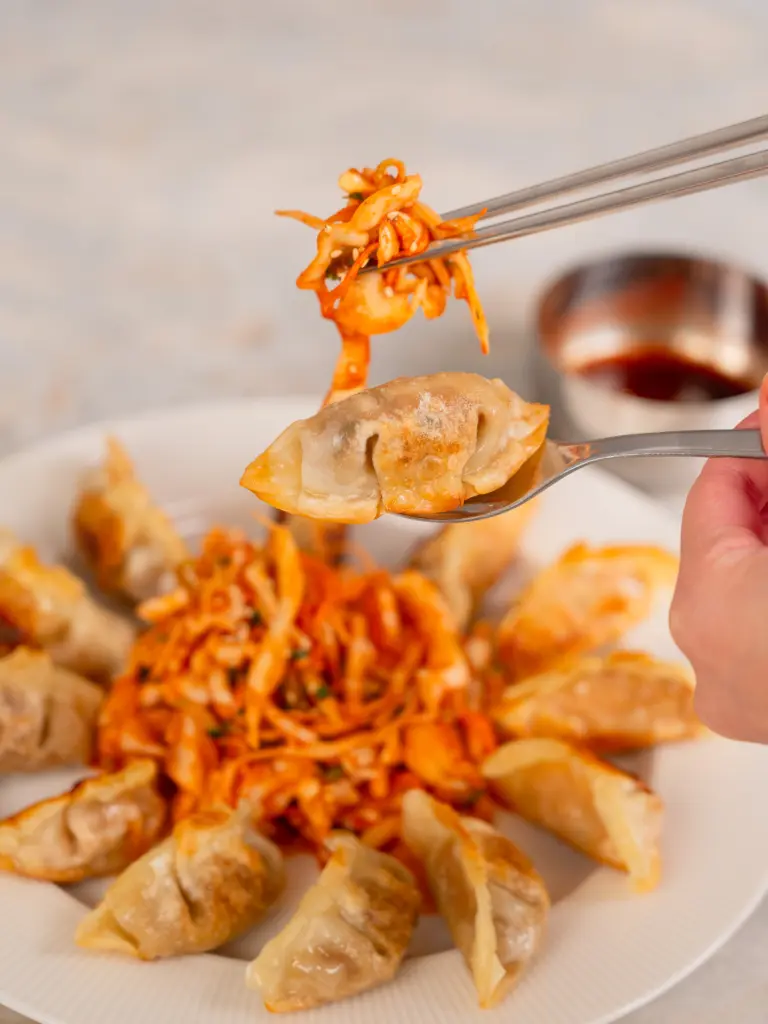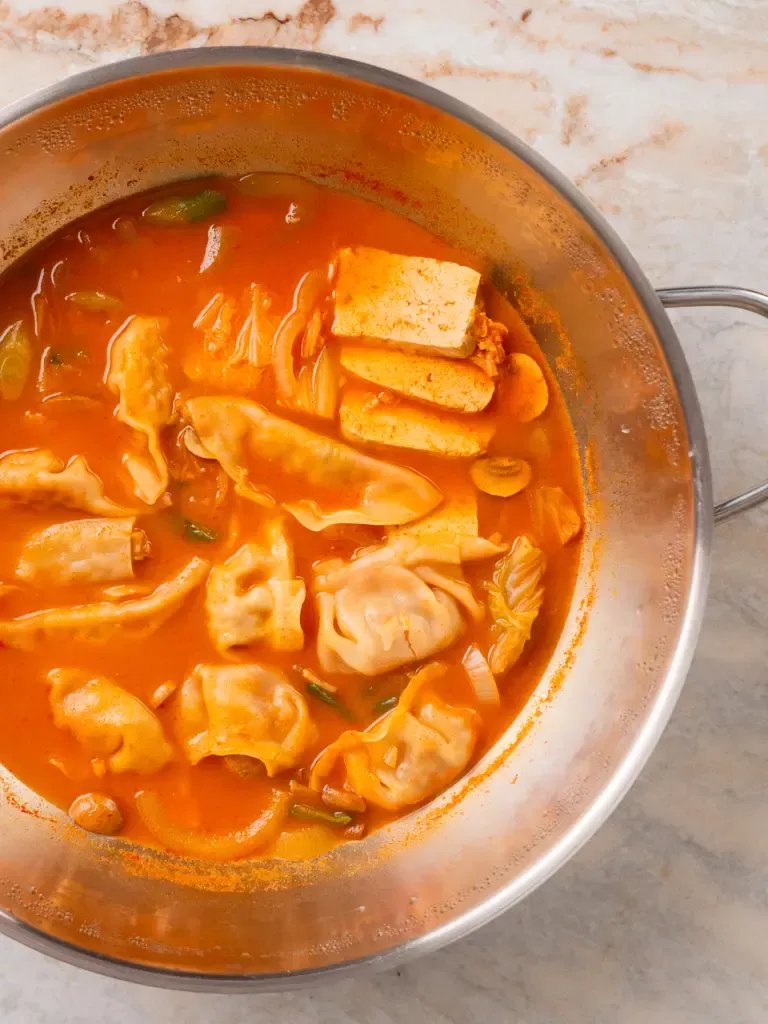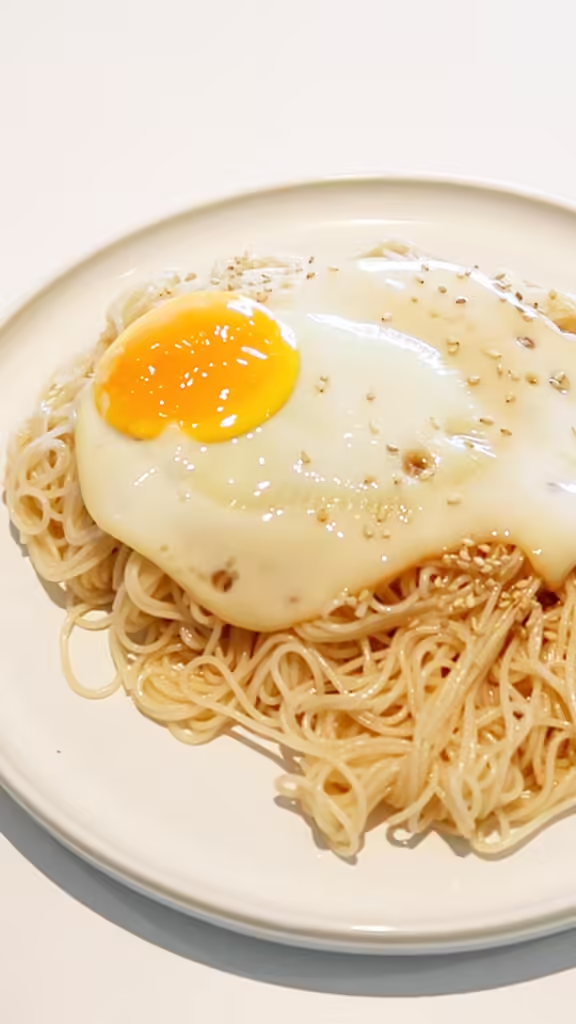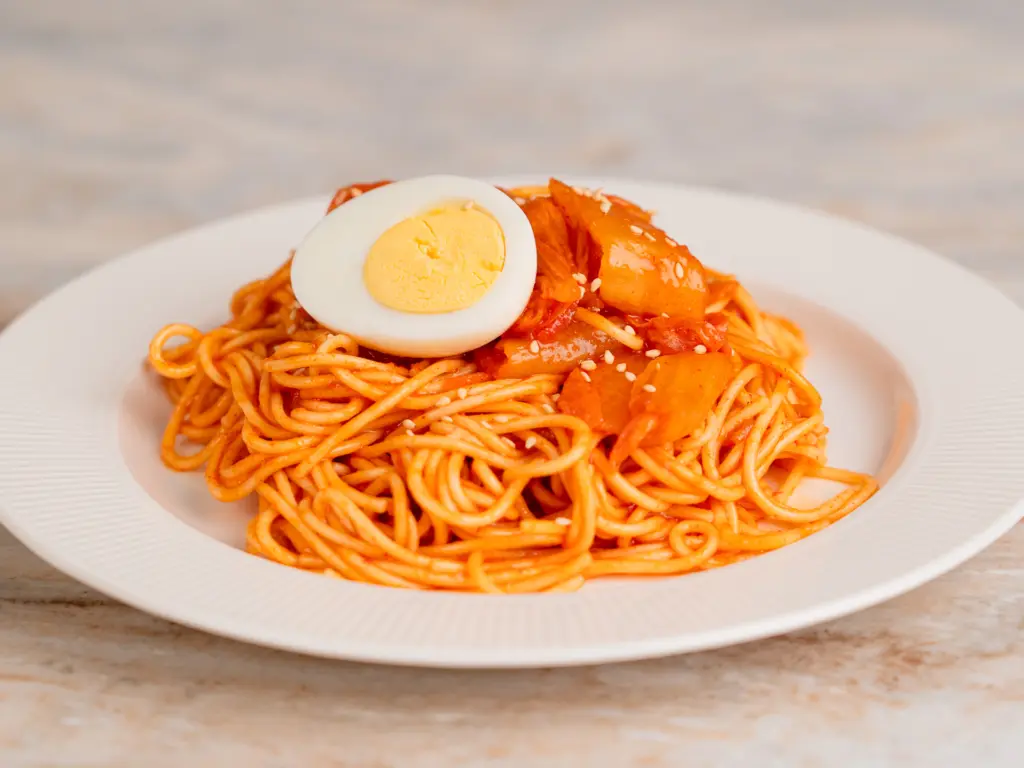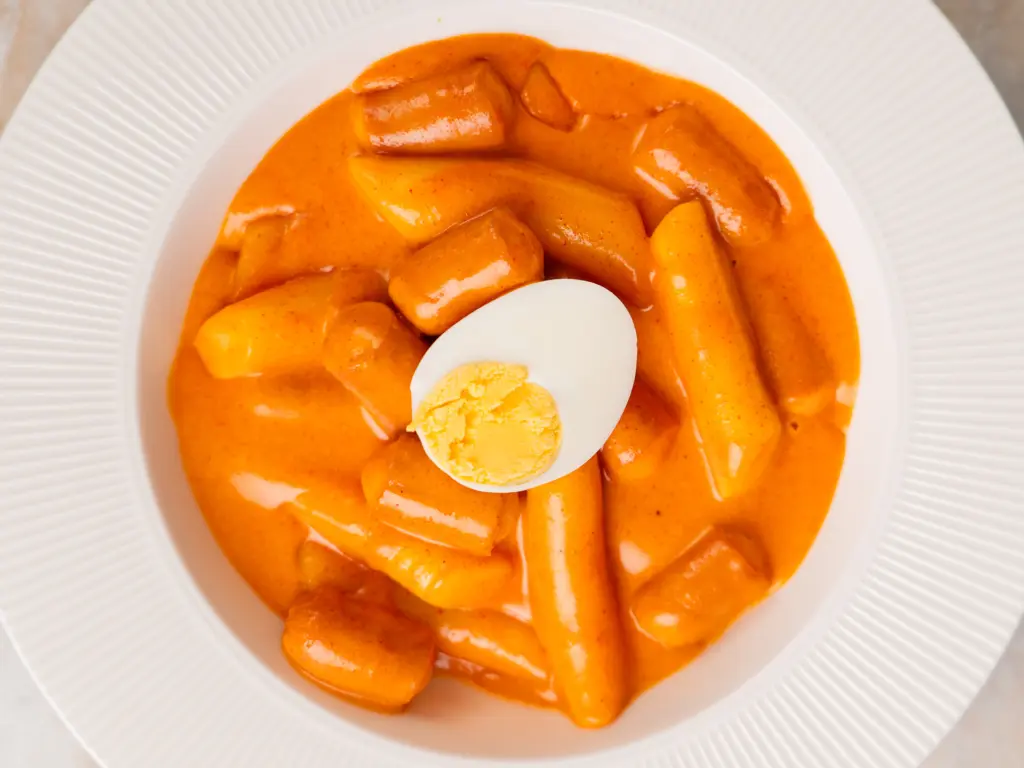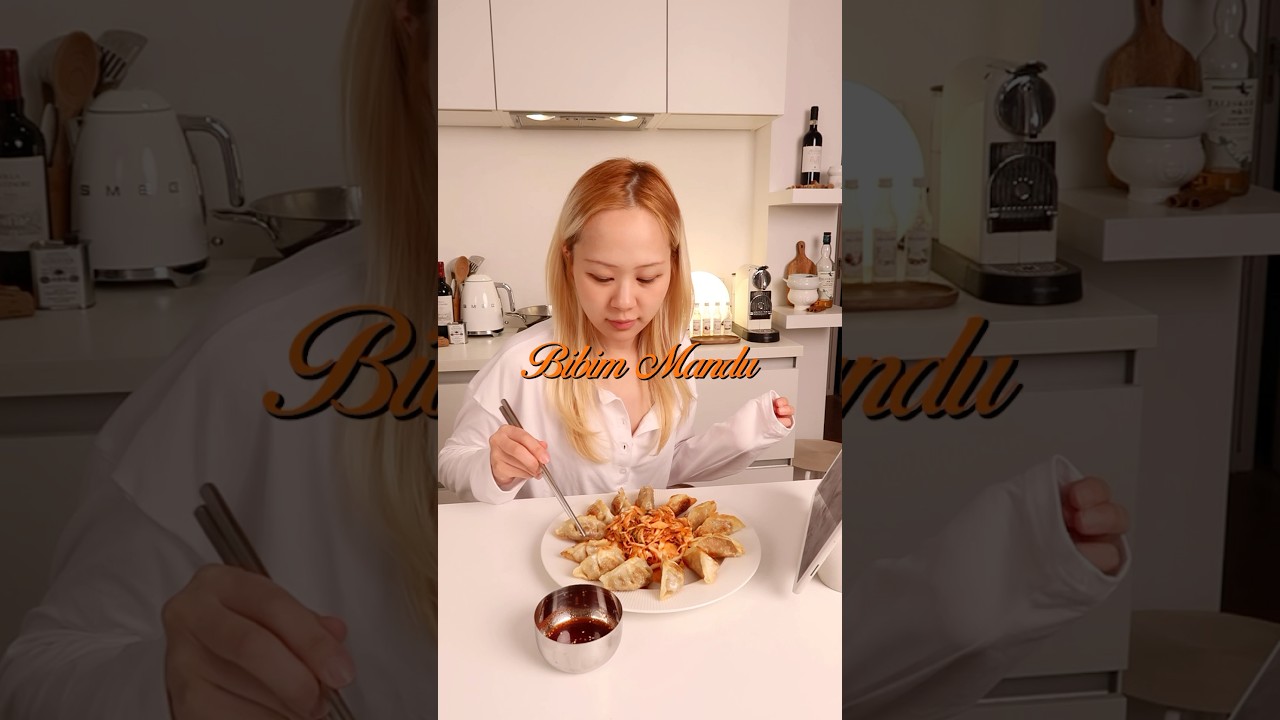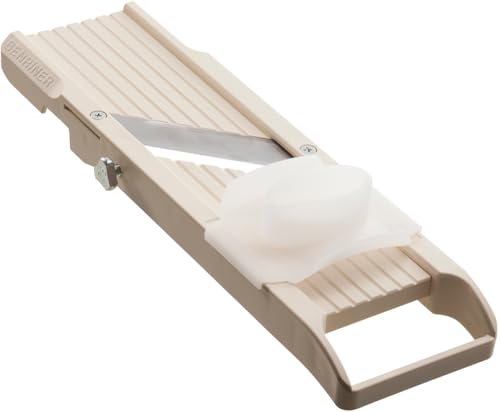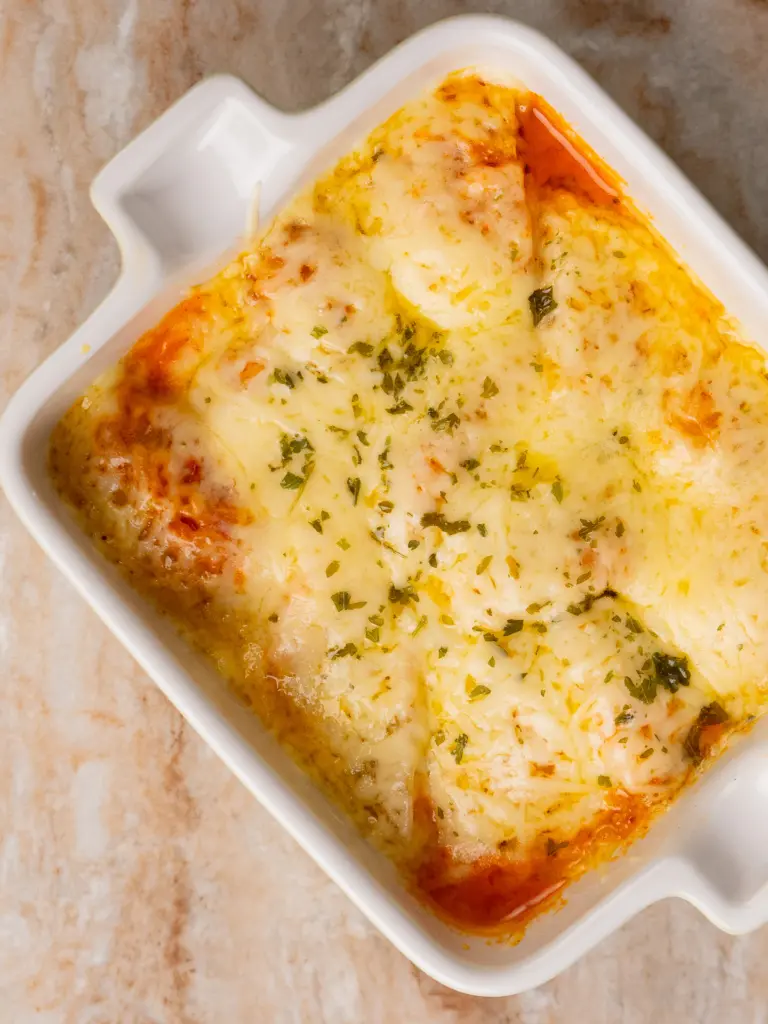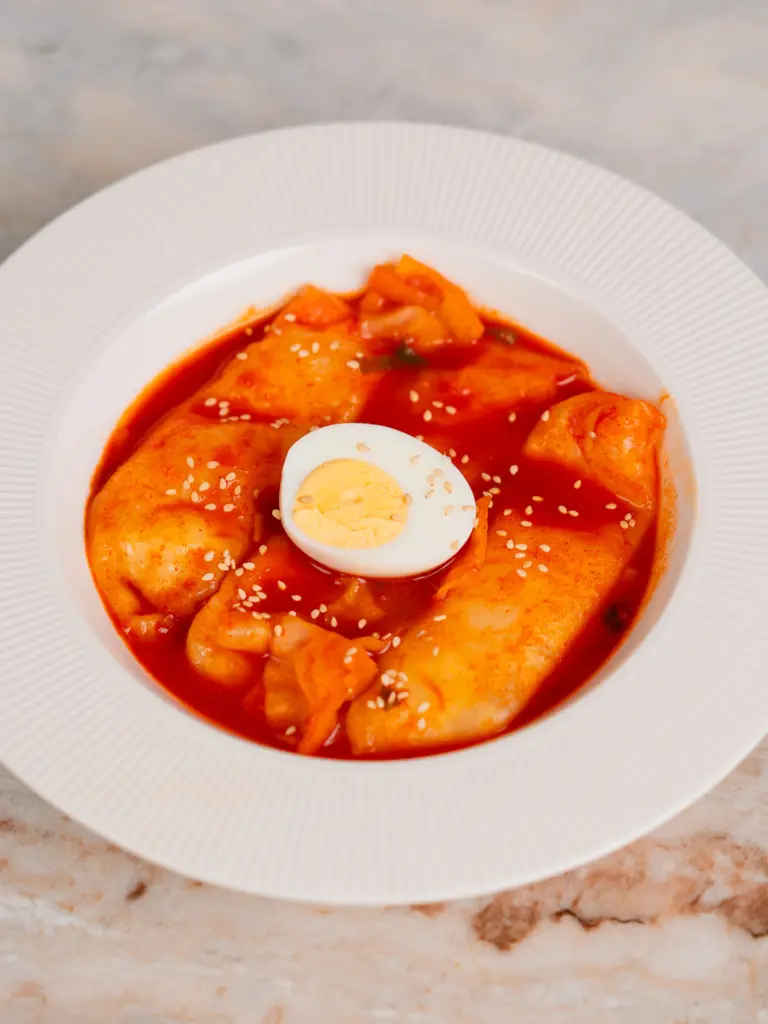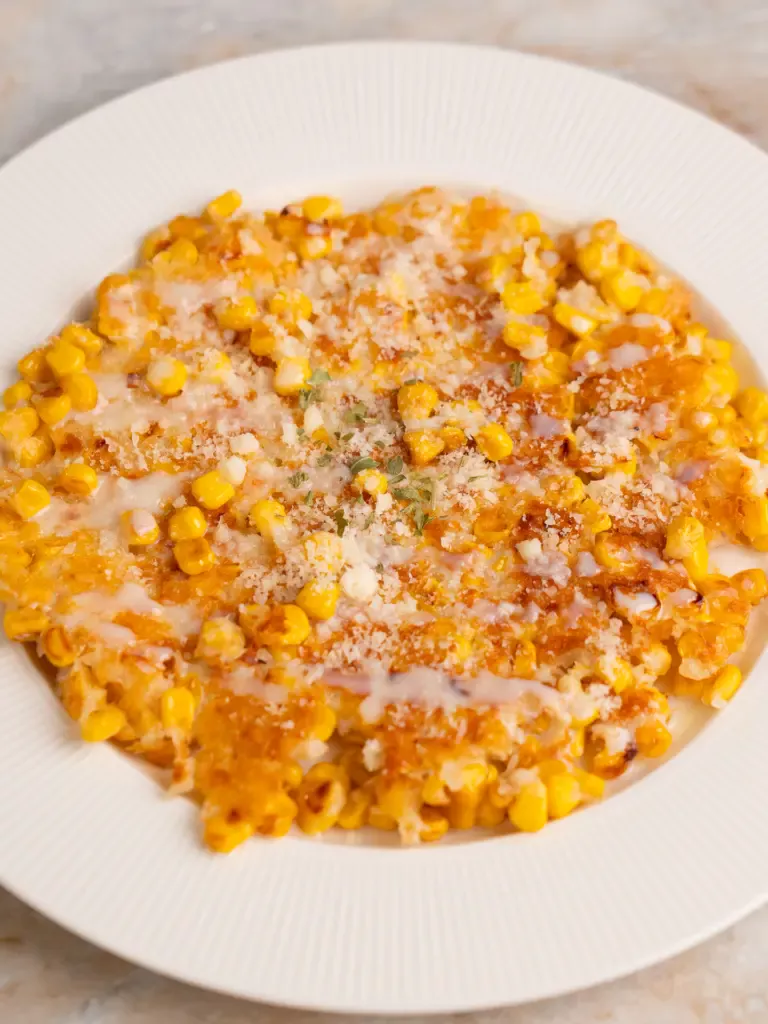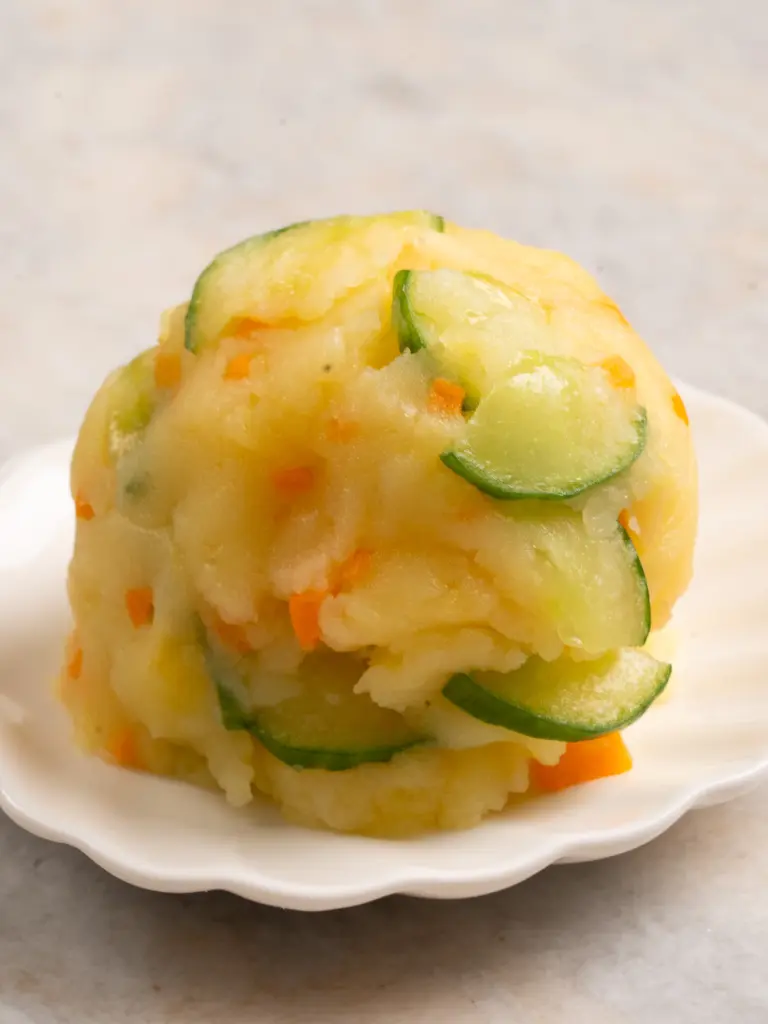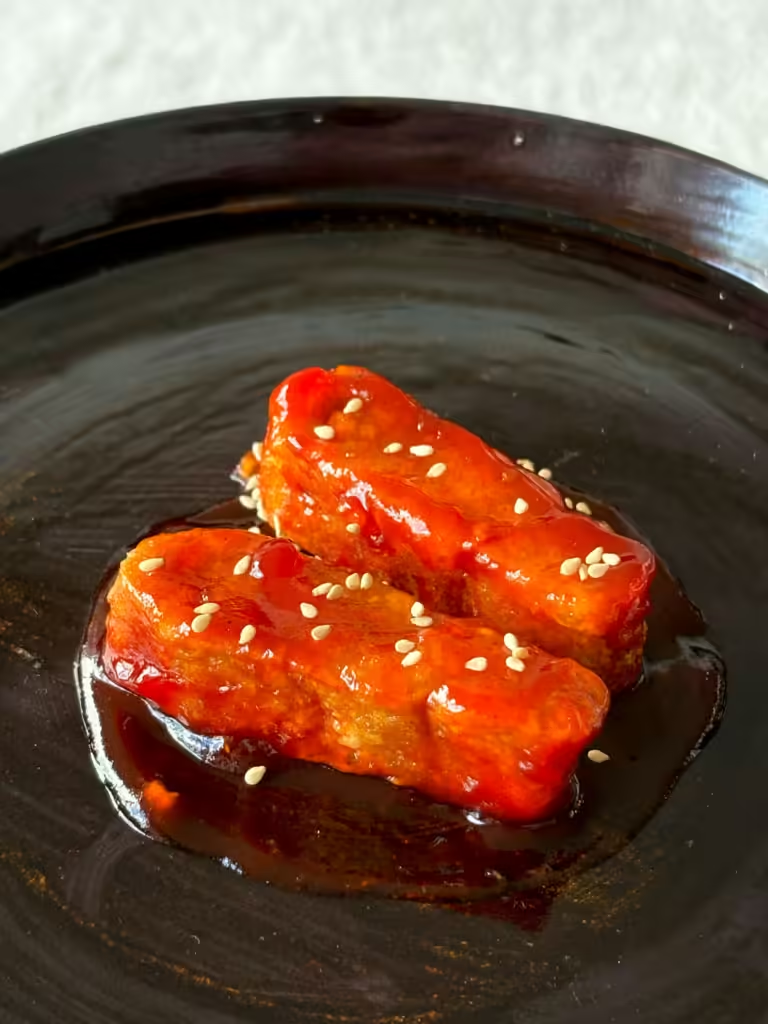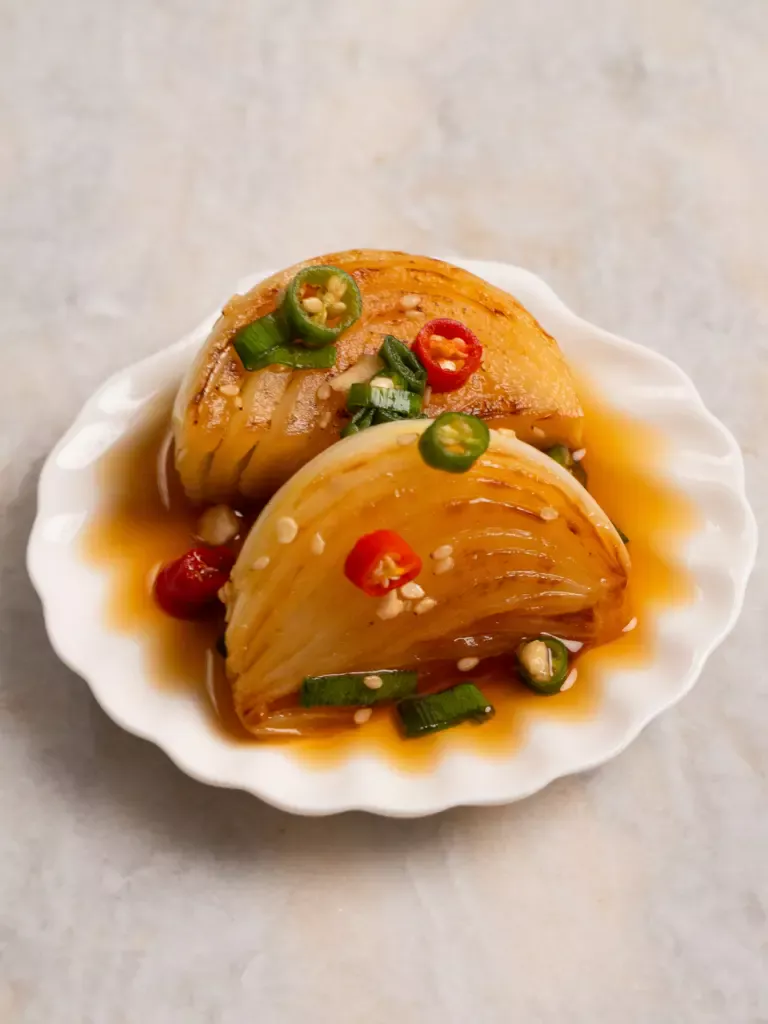Bibim Mandu Salad – Korean Fried Dumplings with Coleslaw
Today, let’s make Korean Bibim Mandu Salad 비빔 만두 which is called Korean potsticker salad bibim mandu. I’ll show you everything, from how to make the dumplings super crispy to how to prepare a delicious Korean-style coleslaw.
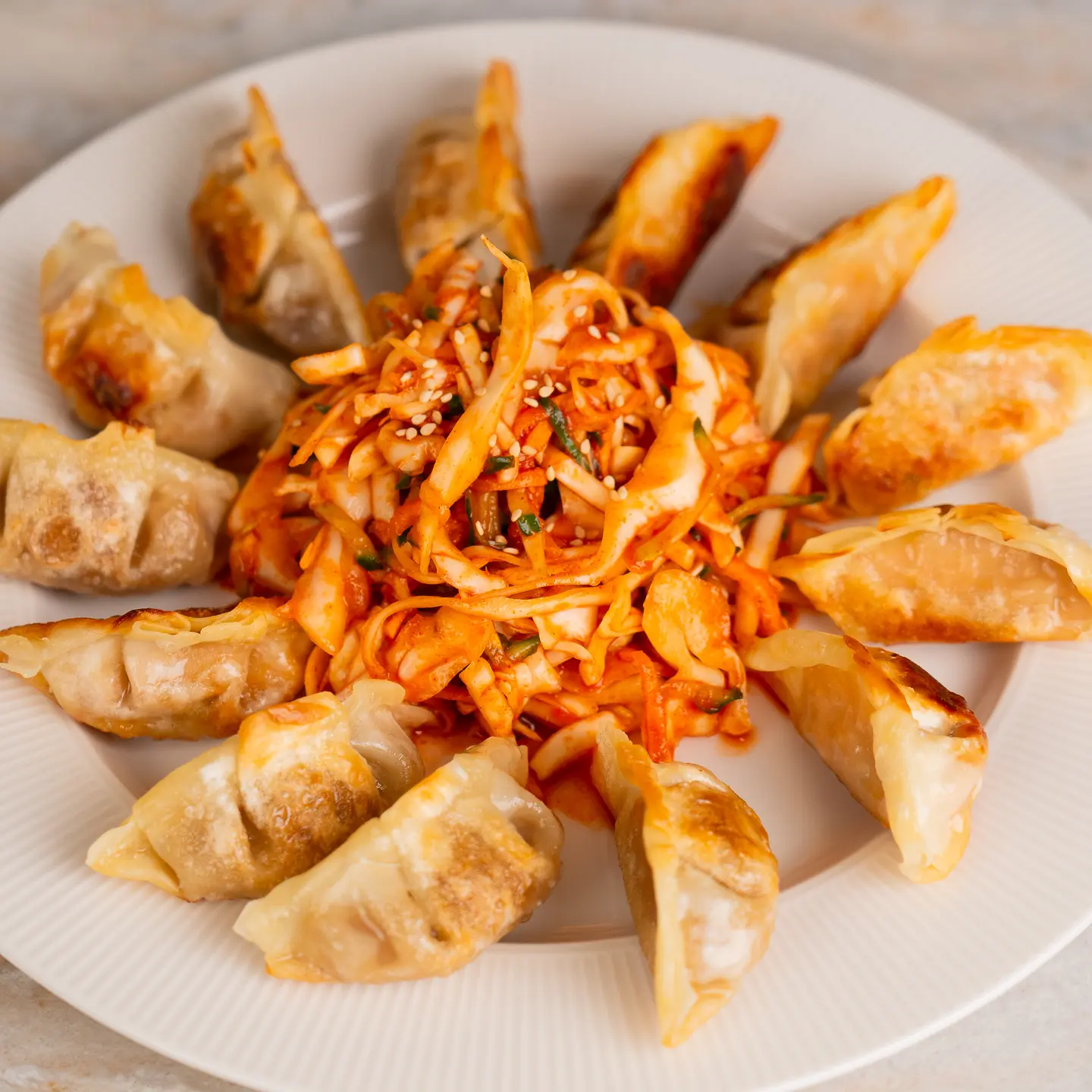
Korean Mandu
Korean mandu is becoming increasingly popular around the world. What is Mandu? They’re known for their thin, tender wrappers and fresh fillings like meat and vegetables – flavors that many foreigners find appealing.
It was originally served in royal court cuisine but is now a popular everyday food found in supermarkets, restaurants, snack bars, food trucks, and on the street. You can find all kinds, from Galbi and shrimp to veggie dumplings, even in unique flavors not available in Korea.
Korean Dumpling Cooking Methods
There are 3 ways to cook dumplings in Korea. They can be steamed in a steamer, boiled in water, or deep fried or pan fried in oil. For today’s bibim mandoo, we’ll be frying the dumplings in oil to make them extra crispy.
Dumplings Around Asia: Korea, Japan, and China
Dumplings are beloved all across Asia, but each country adds its own unique twist. Here’s a quick look at the differences between Korean mandu, Japanese gyoza, and Chinese dumplings (jiaozi).
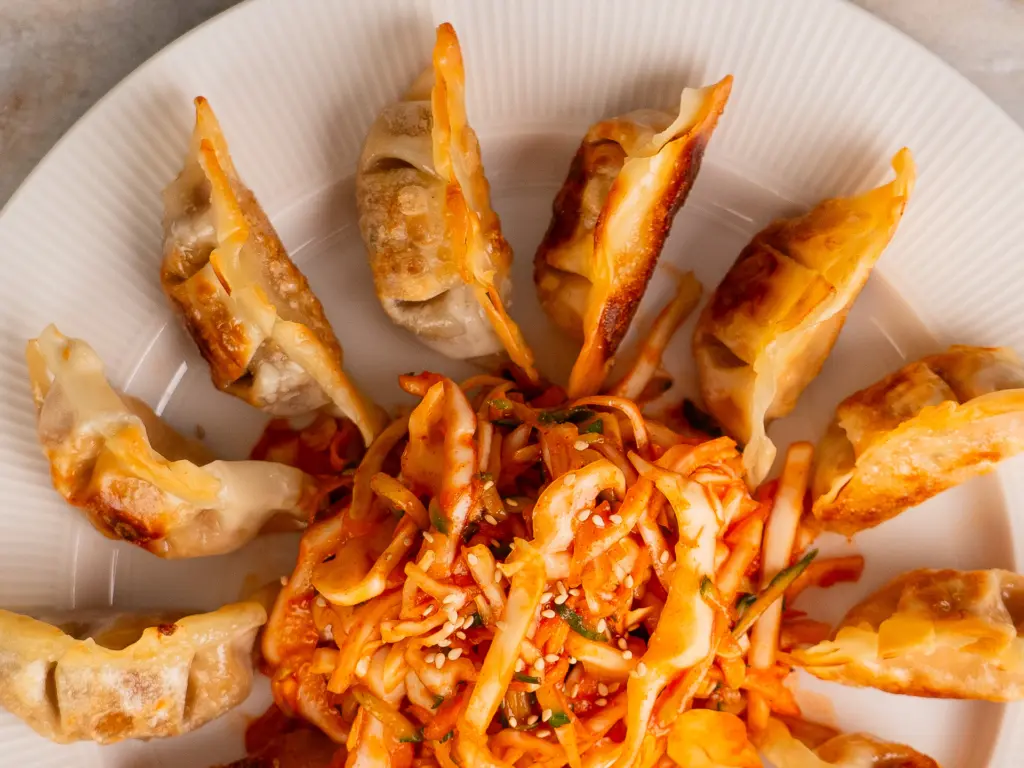
Korean Mandu
- Big and round shape or half moon shape
- Steamed, boiled, or pan-fried
- Fillings: pork, vegetables, kimchi, tofu etc
- Eaten with soy sauce and vinegar, or in dumplings soup or kimchi stew
- This is a Korean mandu jeongol recipe. It’s a simple dish where you just add dumplings and vegetables all at once and let it boil, so it’s something Koreans often make at home.
Mandu Jeongol. Spicy Korean Hot Pot with Dumplings
Japanese Gyoza
- Finely chopped fillings: pork, cabbage, garlic, ginger
- Usually pan-fried with crispy bottom (yaki gyoza)
- Also steamed or boiled
Chinese Dumplings (Jiaozi)
- Most variety in types and cooking methods (steamed, boiled, pan-fried)
- Fillings: pork, shrimp, chicken, vegetables
- Eaten with soy sauce-based dipping sauce
- Traditional New Year food symbolizing wealth
What is Bibim Mandu Salad?
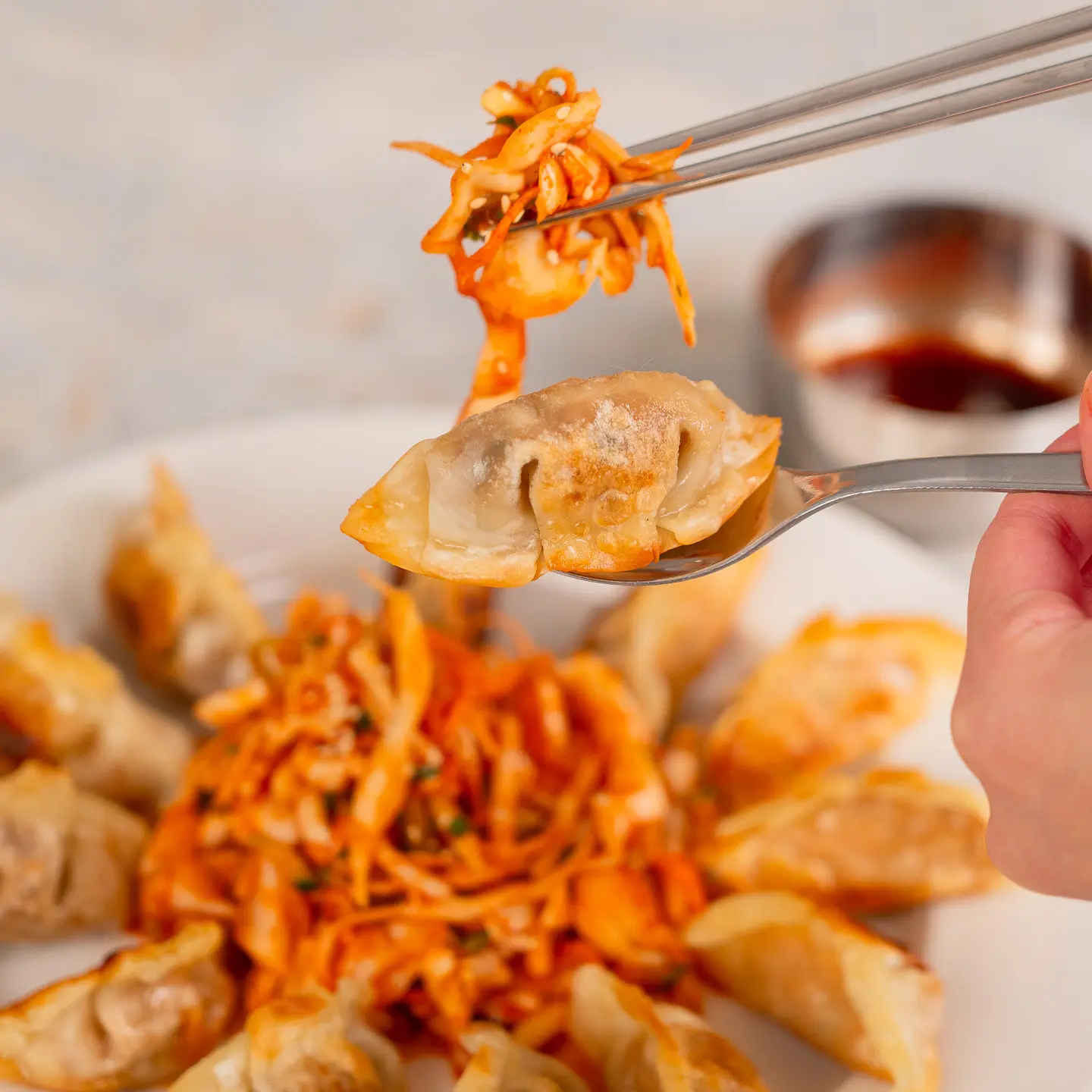
There are many different types of bibim mandoo, but the version we’re making today features crispy fried dumplings served with a Korean-style cabbage salad (Korean spicy dumpling salad). The refreshing, sweet, tangy, and slightly spicy cabbage salad pairs perfectly with the fried mandoo, making it a popular summer dish in Korea.
Ingredients
- Crispy Mandu: You can either pan-fry or deep-fry the dumplings—both work well. Just fry them until they turn golden and crispy.
- Spicy Coleslaw: This salad includes thinly sliced cabbage, cucumber, and carrot. These veggies are tossed with a spicy, sweet, and tangy Korean-style dressing made with gochujang (Korean chili paste), gochugaru (Korean chili flakes), sugar, and vinegar.
- Dipping Sauce: The dumplings dipping sauce is super simple. You only need soy sauce and vinegar. Many Koreans like to add a pinch of gochugaru for an extra kick. This sauce helps cut through the oiliness of the fried mandoo and gives a refreshing contrast.
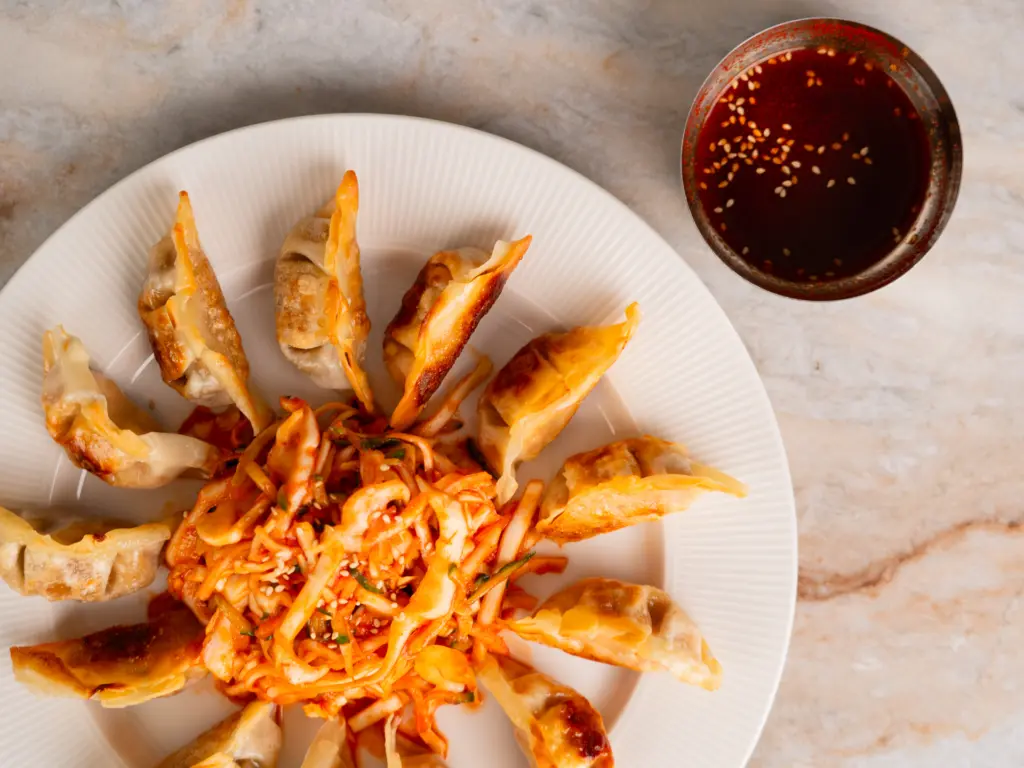
How to Make Crispy Fried Dumpling
Oil-Frying Method
For truly crispy mandu, frying in oil is the key. Air fryers just can’t match the deep, nutty crunch that comes from real frying. There are two ways to fry: deep-frying and pan-frying.
Deep-frying produces the most evenly cooked, restaurant-style results, thanks to high heat and complete oil coverage. But for home cooking, pan-frying is easier and still delicious. Just add oil to a frying pan and fry the dumplings until they’re golden brown and crispy.
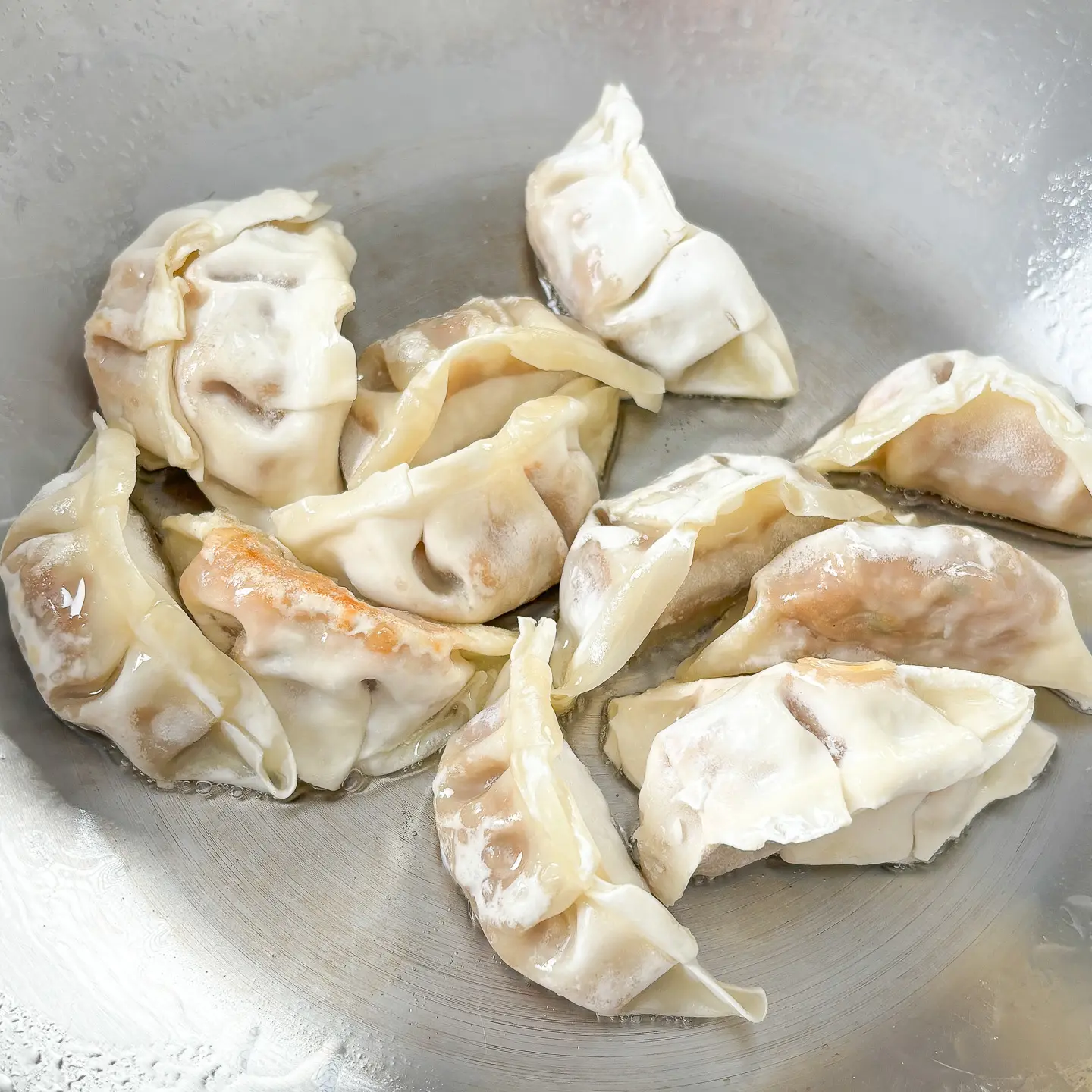
Air Fryer Method
If you’d rather avoid frying in oil, you can use an air fryer. Brush the dumplings lightly with oil and cook them at 180°C (355°F) for about 15 minutes. Flip them halfway through—around the 7-minute mark—to ensure both sides cook evenly. Cooking times may vary depending on your air fryer, so keep an eye on them until they’re perfectly cooked.
Korean-Style Coleslaw
Cabbage is used in many Korean dishes. If you’ve ever seen Korean street toast, you’ve probably noticed the generous pile of shredded cabbage inside. Koreans also steam it or, like today, turn it into a spicy salad.
What is the Mandu Salad Made Of? Shredded cabbage is tossed with a spicy, sweet, and tangy Korean-style dressing made from gochujang (Korean chili paste), gochugaru (chili flakes), soy sauce, sugar, plum syrup, and vinegar. Cucumber and carrot are added for extra crunch, color, and nutrition.
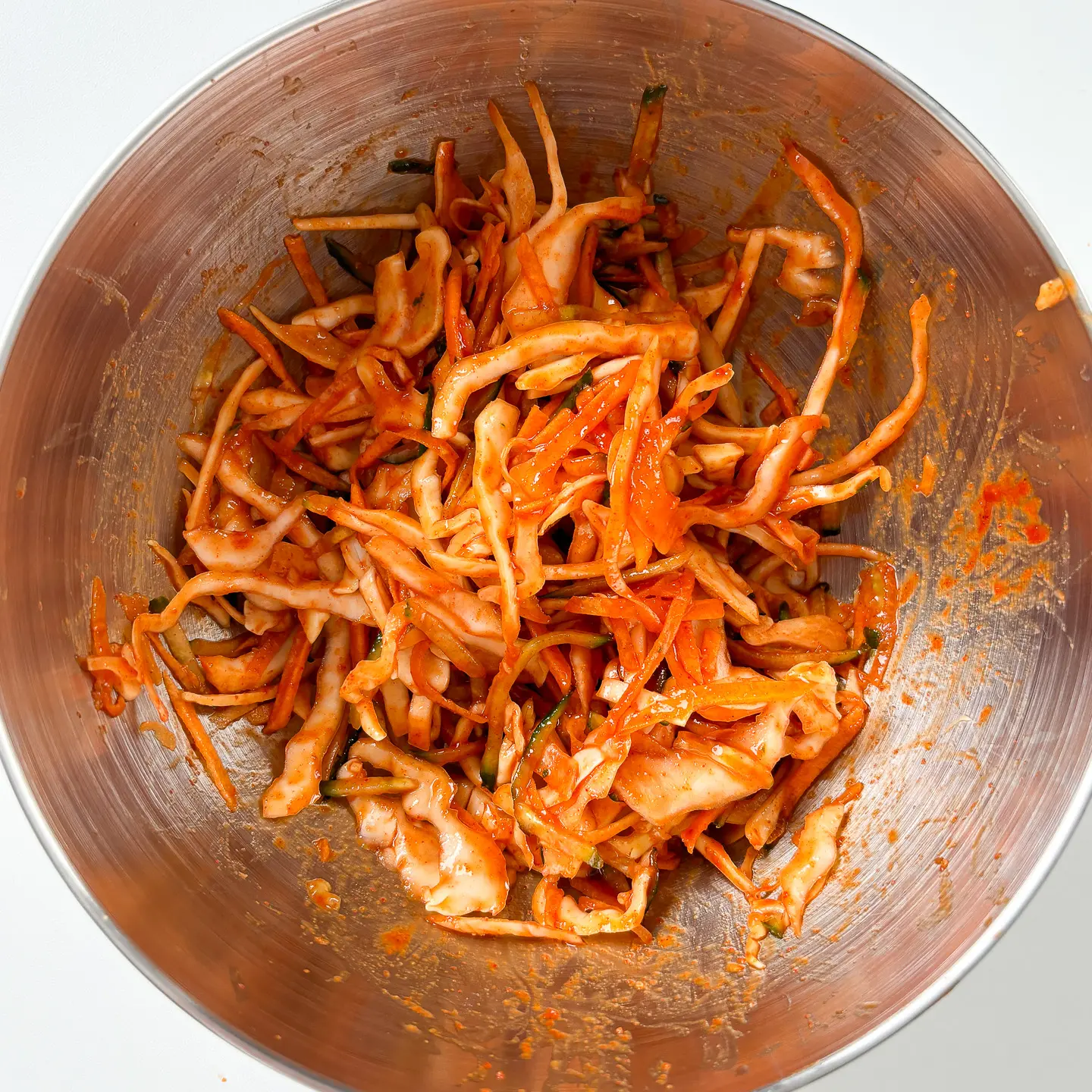
This Korean coleslaw also makes a perfect side dish for Korean BBQ—it’s refreshing, flavorful, and balances out grilled meats beautifully.
How to Make Korean Dipping Sauce
It’s as simple as mixing soy sauce and vinegar in a 1:1 ratio. Many Koreans like to add a small amount of gochugaru (chili flakes) for an extra kick, but that’s optional.
My mom also likes to finely chop some chili peppers or onions and add them to the sauce. When you dip the mandu and top it with some of that fresh onion, it really refreshes your palate and tastes amazing.
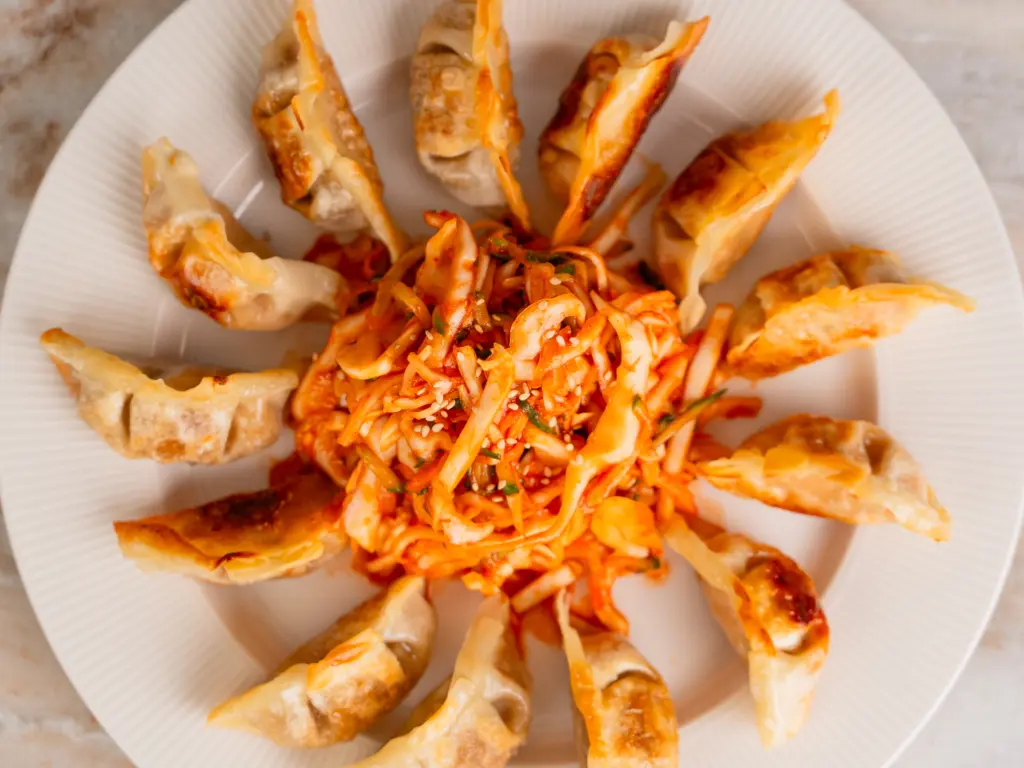
Substitute Ingredients
- Gochugaru (Korean Chili Flakes): If you can’t handle too much spice, I recommend swapping gochugaru with paprika powder. It’ll still give some color and mild flavor without the heat.
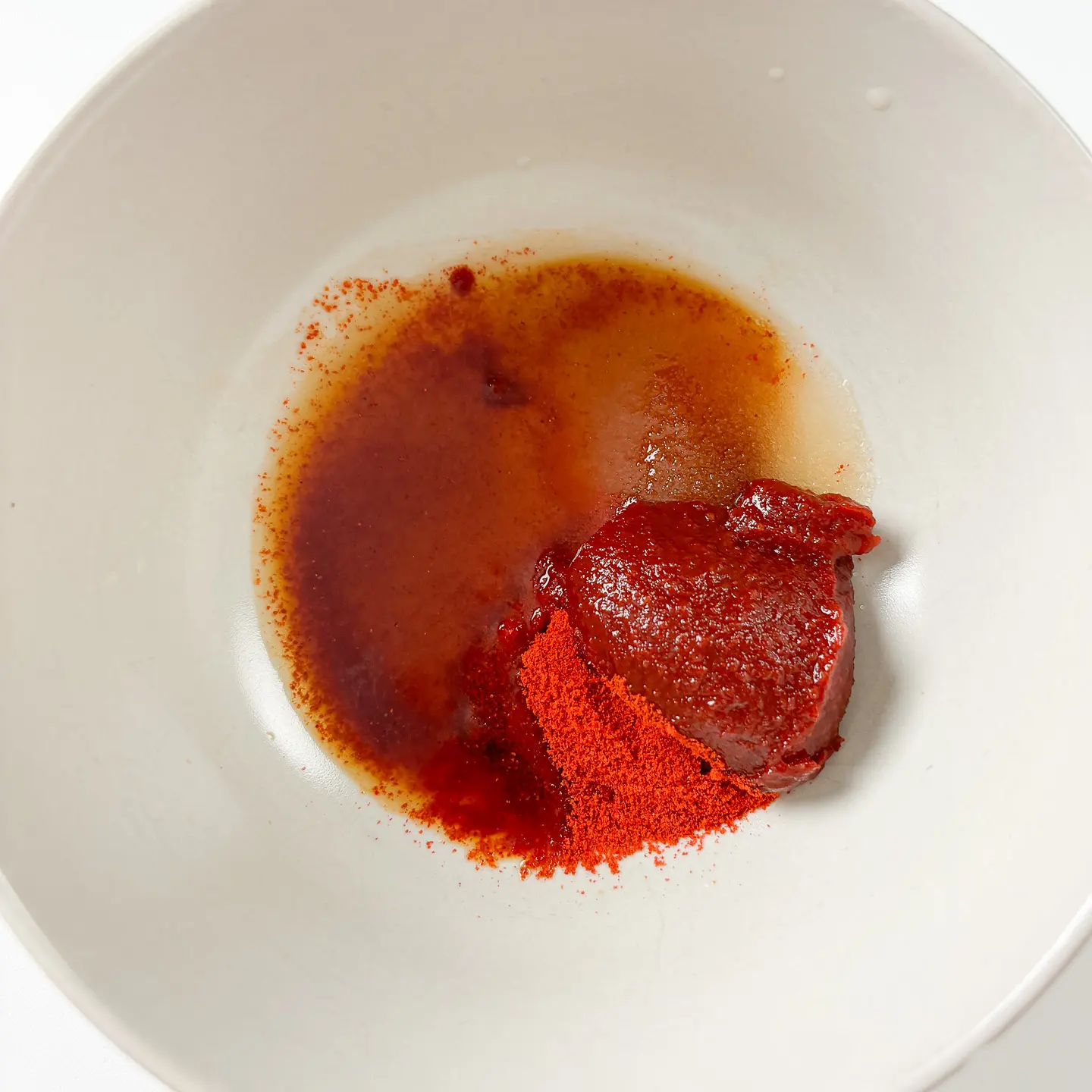
- Plum Syrup (Maesil-cheong): Maesil-cheong adds a subtle sourness, enhancing the umami and fragrance of the dish, giving it a deeper flavor. If you don’t have it, you can replace it with a much smaller amount of sugar, adjusting to taste.
Foods that Pair Well
Koreans often enjoy dumplings with noodles or “bunsik” (Korean street food).
Noodles
Mandu is commonly paired with various noodle dishes like Chamgireum ganjang bibim guksu (sesame oil and soy sauce mixed noodles) or kimchi bibim guksu (kimchi mixed noodles). Many Koreans feel that dumplings alone don’t make a complete meal, so they often pair it with hearty noodles.
Soy Sauce Korean Noodles (Ganjang Bibim Guksu)
Here’s a recipe for Ganjang Bibim Guksu (soy sauce mixed noodles). It’s perfect for people who can’t handle much spice, as it helps balance the heat of the spicy bibim dumplings salad.
Kimchi Bibim Guksu: 10-Min Korean Spicy Cold Noodles
Here’s my mom’s recipe for Kimchi Bibim Guksu. The sweet and tangy kimchi noodles are a fantastic match for the fried mandu, as they help cut through the richness of the dumplings. I highly recommend enjoying bibim mandoo with kimchi bibim guksu!
Bunsik (Korean Street Food)
In Korea, people also enjoy fried dumpling with various street foods, especially tteokbokki (spicy rice cakes) and kimbap.
Best Rose Tteokbokki in 15 Minutes – One Pan Recipe
Here’s a recipe for Rose Tteokbokki (rose-flavored spicy rice cakes). Dipping fried mandu into tteokbokki sauce is a beloved treat in Korea!
Get Ingredients
- Stainless Steel Wok Pan: https://amzn.to/3DQgIPu (US), https://amzn.to/4hmr6w3 (DE), https://amzn.to/42f3uVG (NL), https://amzn.to/3RcZnmR (UK)
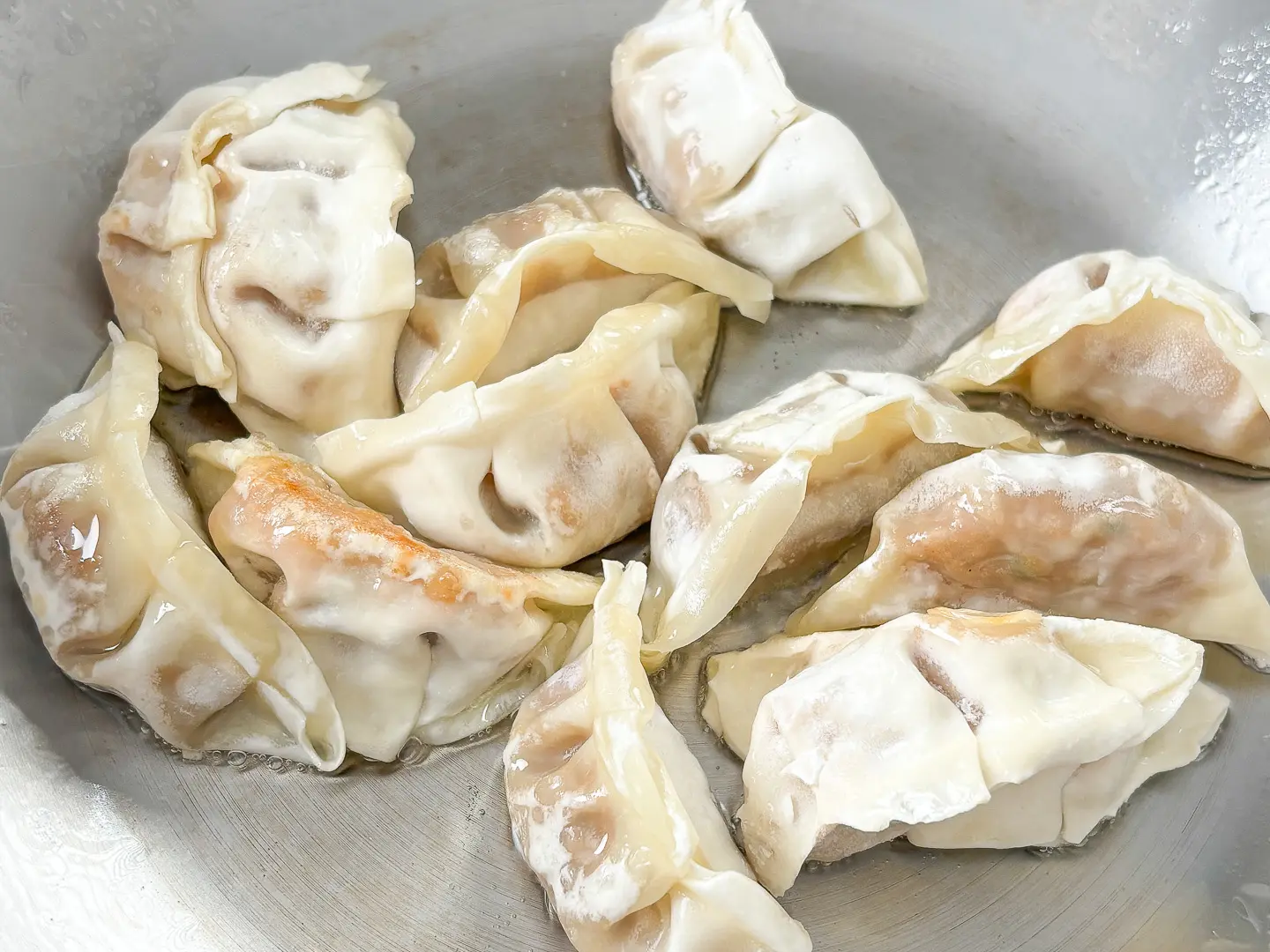
- Maondoline vegetable Slicer: https://amzn.to/4iMWKnw (US), https://amzn.to/3GK0RDc (UK), https://amzn.to/4ixl0KL (NL), https://amzn.to/4bYQ97e (DE)
You can slice vegetables with a knife, but using a vegetable slicer makes it so much easier and quicker. In Korean cuisine, many dishes like bibimbap, japchae, and kimchi use mandoline-sliced vegetables. It’s definitely a handy tool to have in the kitchen—it really saves time and ensures uniform slices.
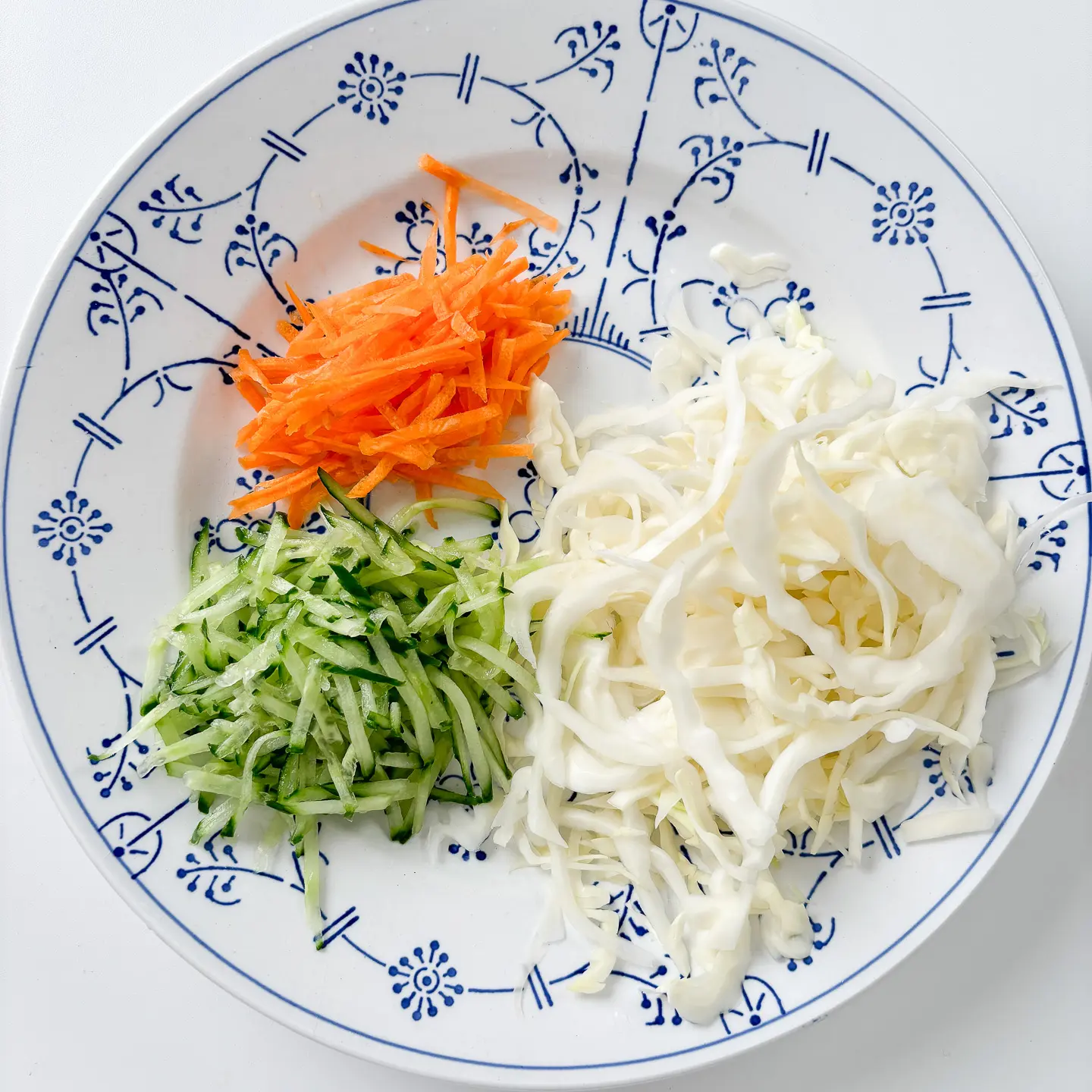
- Bibigo Mandu(dumplings): https://amzn.to/3EcgWAx (US), https://amzn.to/3R9GvFh (DE)
- Gochujang: https://amzn.to/3XstNFi (US), https://amzn.to/4hSoh65 (DE), https://amzn.to/4l4b2BU (NL, BE), https://amzn.to/4curibS (UK)
- Gochugaru (Korean Red Pepper Powder): https://amzn.to/4hD0Duw (US), https://amzn.to/40F34pK (DE), https://amzn.to/425ncTO (UK)
- Plum Syrup: Maesil-cheong adds a subtle sourness, enhancing the umami and fragrance of the dish, giving it a deeper flavor.
- https://amzn.to/3XTBVhZ (US), https://amzn.to/4hhzTPJ (NL)
- Soy Sauce: https://amzn.to/4gYk1BJ (US), https://amzn.to/4gW8zGv (DE), https://amzn.to/3Ef2bgl (UK), https://amzn.to/43OACVz (NL, BE)
Disclosure: Blonde Kimchi is part of the Amazon Services LLC Associates Program, an affiliate advertising program that allows websites to earn advertising fees by linking to Amazon.com and promoting products.
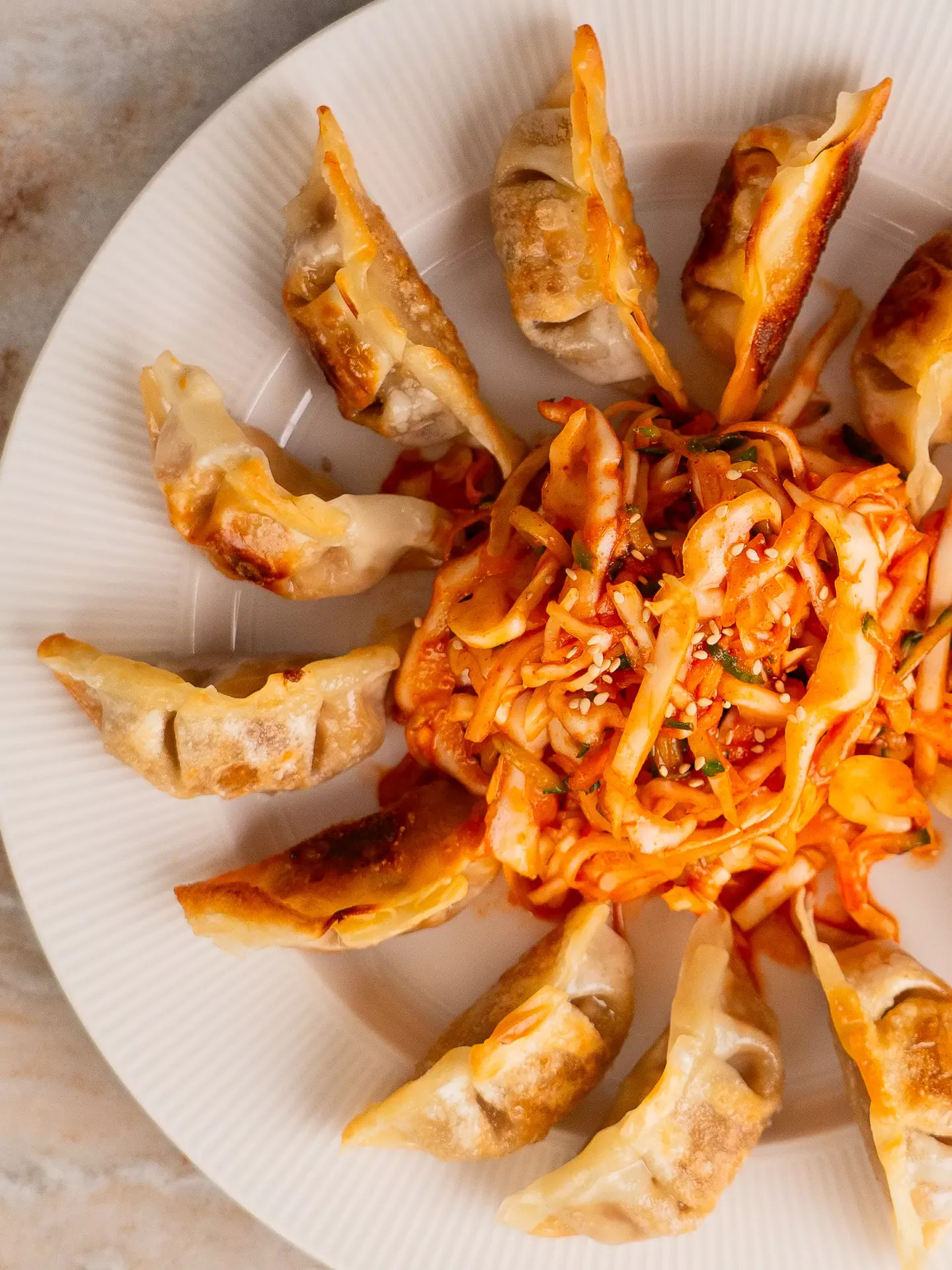
Bibim Mandu Salad – Korean Fried Dumplings with Coleslaw
Equipment


Ingredients
Mandu (Dumplings)
- 10 pieces mandu (Korean dumplings)
- 8 tbsp cooking oil (for pan-frying)
Coleslaw vegetables
- 50 g cabbage
Coleslaw Sauce
- 1/2 tbsp Korean chili flakes (gochugaru)
- 1 tbsp Korean cili paste (gochujang)
- 2 tbsp vinegar
- 1 tbsp soy sauce
- 1 tbsp plum syrup
- 1 tbsp sugar
Instructions
- Shred the Vegetables:Julienne the cabbage, cucumber, and carrot into thin strips.

- Make the Cabbage Sauce:Mix together gochugaru, gochujang, vinegar, soy sauce, plum syrup, and sugar. (Note: If you're adjusting the vinegar to 1.5 tbsp instead of 2 tbsp, it will slightly mellow the tang.)

- Toss the Salad:Mix the shredded cabbage with the sauce until well coated.
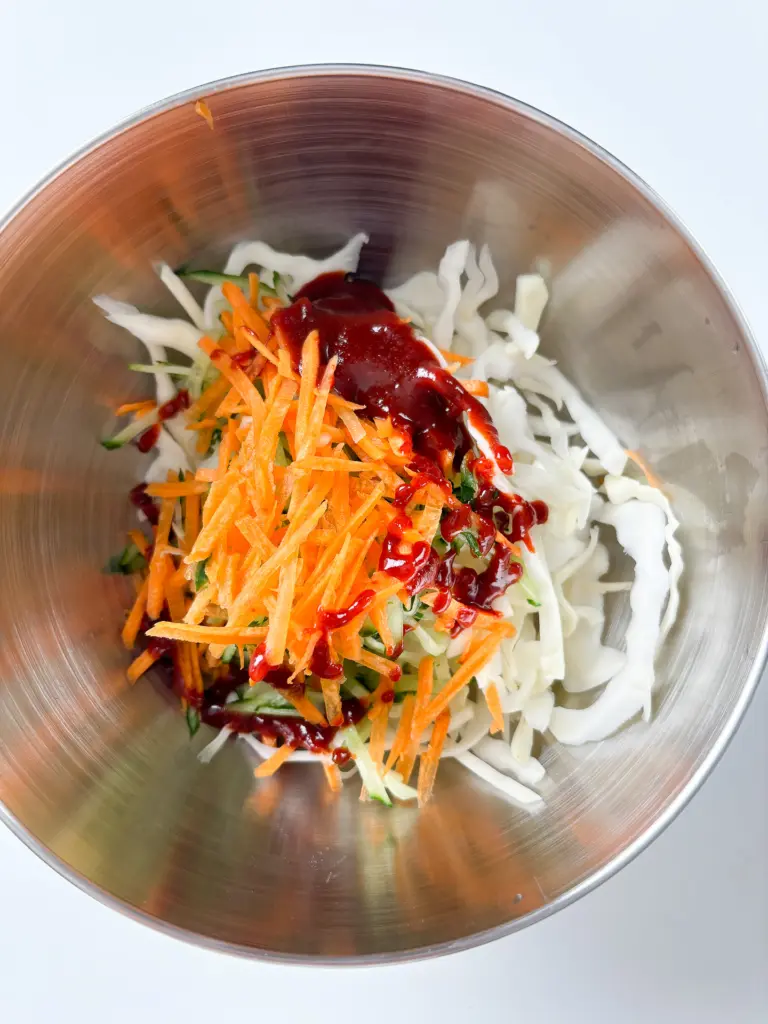
- Set aside to let it marinate while you cook the dumplings.
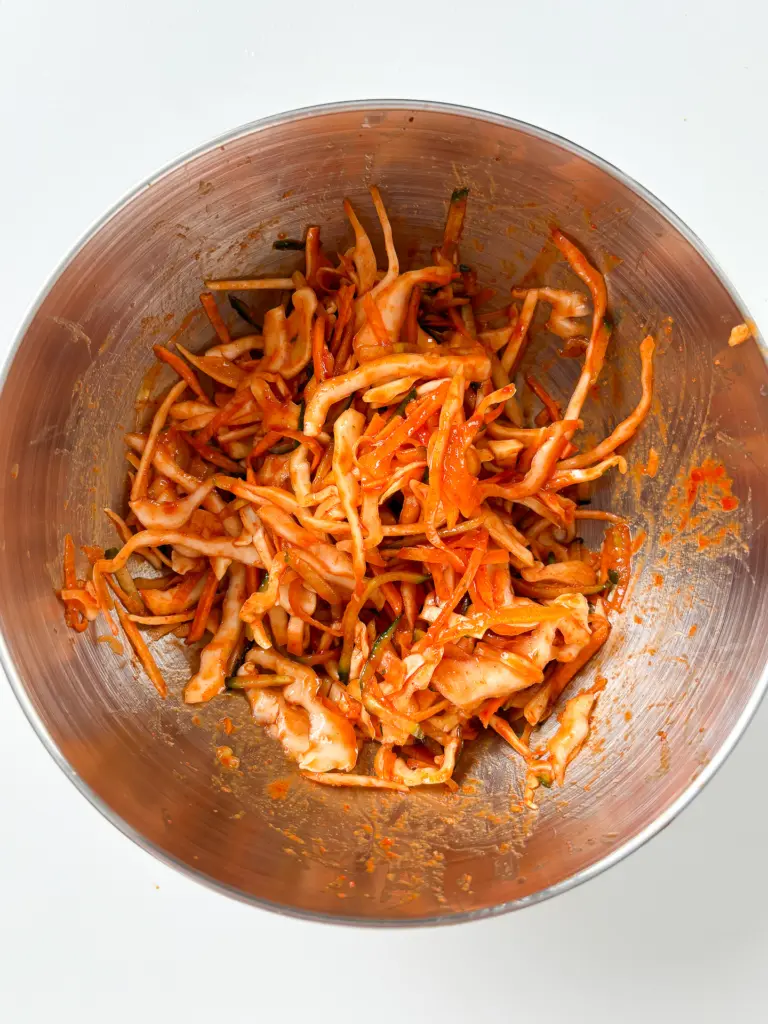
- Cook the Dumplings:Heat a pan over medium-high heat. Once hot, reduce to medium-low and add a generous amount of oil.Place the dumplings in the pan and pan-fry until golden and crispy on all sides, flipping occasionally.
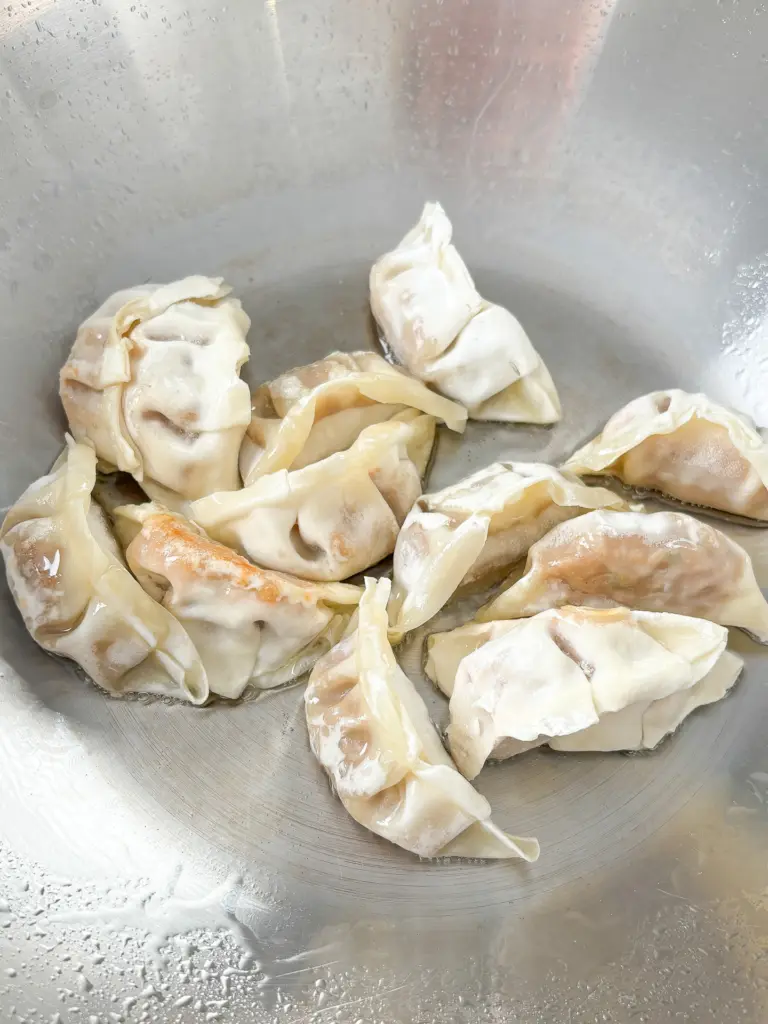
- Make the Dipping Sauce:Combine soy sauce, vinegar, and gochugaru to create a simple dipping sauce for the dumplings.
- ServeServe the hot dumplings with the cabbage salad on the side.Dip the mandu in the soy sauce or enjoy them together with the spicy cabbage mix.
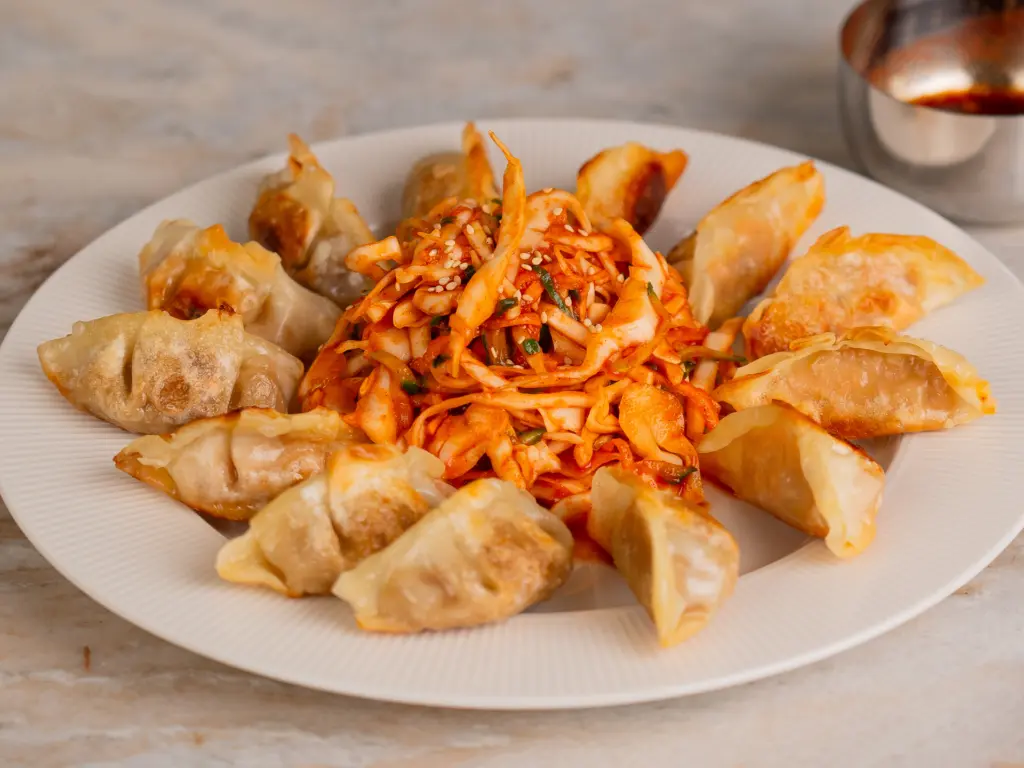
Bibim Mandu Salad 비빔만두
- Jal meokgetseumnida! 잘 먹겠습니다!

- Dip the mandu in soy sauce and enjoy it with the coleslaw!
